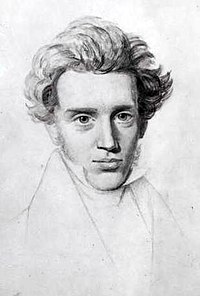Søren Aabye Kierkegaard (Pípè: /ˈsɔrən ˈkɪərkəɡɑrd/ or /ˈkɪərkəɡɔr/; Àdàkọ:IPA-da) (5 May 1813 – 11 November 1855)
| Søren Aabye Kierkegaard |
|---|
 Sketch of Søren Kierkegaard by Niels Christian Kierkegaard, c. 1840 |
| Orúkọ | Søren Aabye Kierkegaard |
|---|
| Ìbí | 5 May 1813
Copenhagen, Denmark |
|---|
| Aláìsí | 11 Oṣù Kọkànlá 1855 (ọmọ ọdún 42)
Copenhagen, Denmark
|
|---|
| Ìgbà | 19th-century philosophy |
|---|
| Agbègbè | Western philosophy |
|---|
| Ẹ̀ka-ẹ̀kọ́ | Danish Golden Age Literary and Artistic Tradition, precursor to Continental philosophy,[1][2] Existentialism (agnostic, atheistic, Christian), Postmodernism, Post-structuralism, Existential psychology, Absurdism, Neo-orthodoxy, and many more |
|---|
| Ìjẹlógún gangan | Religion, metaphysics, epistemology, aesthetics, ethics, psychology, philosophy of religion |
|---|
| Àròwá pàtàkì | Regarded as the father of Existentialism, angst, existential despair, Three spheres of human existence, knight of faith, infinite qualitative distinction, leap of faith |
|---|
Ipa látọ̀dọ̀
Abraham, Aristotle, Christian Molbech, Hamann, Hegel, Kant, Lessing, Luther, Socrates[3] (through Plato, Xenophon, Aristophanes), Trendelenburg
|
Ìpa lórí
Most philosophers after him including Auden, Barth, Binswanger, Bonhoeffer, Borges, Brandes, Brunner, Buber, Camus, de Beauvoir, Derrida, Frankl, Heidegger, Hesse, Ibsen, Jaspers, Kafka, Marcel, May, Percy, Rilke, Sartre, Shestov, Strindberg, Tillich, Unamuno, Updike, Urs von Balthasar, Welsh, Wittgenstein |
| Ìtọwọ́bọ̀wé |  |
|---|
- ↑ This classification is anachronistic; Kierkegaard was an exceptionally unique thinker and his works do not fit neatly into any one philosophical school or tradition, nor did he identify himself with any. However, his works are considered precursor to many schools of thought developed in the 20th and 21st centuries. See 20th century receptions in Cambridge Companion to Kierkegaard.
- ↑ (Hannay & Marino, 1997)
- ↑ The influence of Socrates can be seen in Kierkegaard's Sickness Unto Death and Works of Love.

